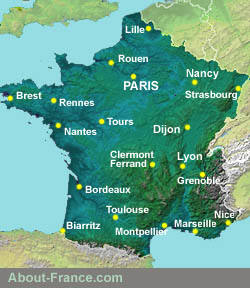►
You are here: France
› French
grammar › Conjunctions
Conjunctions in French - coordination and subordination
Conjunctions - an introduction
Conjunctions are short words which link two or more similar elements
(words, phrases or clauses) of a sentence. They can
either be coordinating conjunctions, such as et
or ou, which give equal
value to the two elements being coordinated; or else they can be
subordinating conjunctions, such as
parce que or puis,
which make the conjoined word, phrase or clause dependent on, or
subordinate to, the principal one.A third catefgory of conjunctions, known as correlating conjunctions, serve to add two similar elements or provide a choice between them. Basically these are a form of coordinating conjunction that are used differently, in that they are made up of two separate elements. There are just four correlating conjunctions in French: ni... ni... , ou... ou... soit... soit... and et... et...
Linguists have long argued over the nature of and disctinction between coordinating conjunctions and subordinating conjunctions. Why is car described as a coordinating conjunction, while puisque is defined as a subordinating conjunction? They are often used as synonyms. The same arguments exist in English grammar, where for is considered as a coordinating conjunction while because - often used synonymously - is considered as a subordinator.
The difference is academic and seems to be one of usage rather than of nature. Coordinating conjunctions must stand between the two elements that are conjoined. Subordinating conjunctions can stand between the two conjoined clauses, or alternatively be placed at the start of a sentence..More on this below.
1. Coordinating conjunctions
There are six essential conjunctions in French which are generally considered to be coordinators. et, mais, ou, donc, or, and car .Comme in the sense of as can also be used to coordinate words and phrases
Ni is rarely used on its own as a coordinator. It is almost always used in the correlating expression ni.. ni..
- Et , ou and mais (pas) can be used to coordinate either nouns or phrases or clauses
- Donc, or and car can only coordinate clauses
Examples
J'ai mangé une grande glace et une petite pomme
Tu dois acheter six pizzas ou six paninis
C'est ma mère ou mon père qui me l'a dit.
J'ai fini de lire le pemier livre mais pas le second livre.
J'ai parlé à mon oncle comme à ma tante.
Jean a pris la voiture mais Pierre a pris le train
Tu feras la vaisselle ou tu iras au lit
J'ai bien mangé donc je n'ai plus faim.
Je n'ai plus faim car j'ai bien mangé
Il devait tourner à gauche, or il a tourné à droite par erreur.
Linking
words and phrases
Jean et Pierre sont
déjà
arrivésJ'ai mangé une grande glace et une petite pomme
Tu dois acheter six pizzas ou six paninis
C'est ma mère ou mon père qui me l'a dit.
J'ai fini de lire le pemier livre mais pas le second livre.
J'ai parlé à mon oncle comme à ma tante.
Linking
main clauses
Jean a pris la voiture et
Pierre a pris le train.Jean a pris la voiture mais Pierre a pris le train
Tu feras la vaisselle ou tu iras au lit
J'ai bien mangé donc je n'ai plus faim.
Je n'ai plus faim car j'ai bien mangé
Il devait tourner à gauche, or il a tourné à droite par erreur.
When linking main clauses, the coordinated or conjoined clause has to follow the primary clause.
We can say
Jean
a pris la voiture et
Pierre a pris le train.
or Je n'ai plus faim car j'ai bien mangé.
but we cannot sayor Je n'ai plus faim car j'ai bien mangé.
Et Pierre a pris le train, Jean a
pris la voiture....
nor Car j'ai bien mangé, je n'ai plus faim .
nor Car j'ai bien mangé, je n'ai plus faim .
2. Subordinating conjunctions
Subordinating conjunctions are more numerous, and include a number of what are known in French as locutions subjonctives, or more simply in English conjunctive phrases, which end in que.Main examples: comme, quand, que, lorsque, puisque, quoique, si, and conjunctive phrases such as ainsi que, alors que, à moins que, après que, avant que, depuis que, bien que, de peur que, dès que, tandis que and others
With the main exception of ► relative clauses introduced by que, qui or dont, subordinate clauses can either precede or follow the main clause
We can say
Puisqu'il fait beau aujourd'hui, nous
irons à la plage
or Nous irons à la plage puisqu'il fait beau aujourd'hui.
Tout le monde était content quand il a arrêté de parler
or Quand il a arrêté de parler, tout le monde était content.
or Nous irons à la plage puisqu'il fait beau aujourd'hui.
Tout le monde était content quand il a arrêté de parler
or Quand il a arrêté de parler, tout le monde était content.
Examples
Il a parlé aujourd'hui comme il a parlé hier.
Nous partirons quand nous serons prêts.
J'attrappe toujours un rhume lorsqu'il fait froid.
Puisque tu le dis, je viendrai ce soir au cinéma.
Quoiqu'il fasse chaud, le vieux monsieur porte toujours un pullover.
Je vous donnerai un cadeau si vous le méritez
Si vous le méritez, je vous donnerai un cadeau.
Il a fait ainsi qu'il a dit.
Alors qu' il fait chaud, le vieux monsieur porte toujours un pullover.
J'acheterai le pain à moins que la boulangerie ne soit fermée.
Il a changé de métier après qu'il a obtenu son diplôme
Il a changé de métier avant qu'il n'ait obtenu son diplôme
Je t'ai acheté ces belles fleurs afin que tu sois heureuse.
Il a parlé aujourd'hui comme il a parlé hier.
Nous partirons quand nous serons prêts.
J'attrappe toujours un rhume lorsqu'il fait froid.
Puisque tu le dis, je viendrai ce soir au cinéma.
Quoiqu'il fasse chaud, le vieux monsieur porte toujours un pullover.
Je vous donnerai un cadeau si vous le méritez
Si vous le méritez, je vous donnerai un cadeau.
Il a fait ainsi qu'il a dit.
Alors qu' il fait chaud, le vieux monsieur porte toujours un pullover.
J'acheterai le pain à moins que la boulangerie ne soit fermée.
Il a changé de métier après qu'il a obtenu son diplôme
Il a changé de métier avant qu'il n'ait obtenu son diplôme
Je t'ai acheté ces belles fleurs afin que tu sois heureuse.
Use of the subjunctive : note from the examples above that certain subordinating conjunctions require the verb of the subordinate clause to be in the subjunctive.
The main subordinators that require a subjunctive are : à moins que, afin que, avant que (but not après que) , bien que, pourvu que, quoique, pour que, de peur que
A few also traditionally require what is known as the expletive ne : à moins que, avant que, sans que . Note that in these cases the ne is not followed by pas. Sans que only requires an expletive ne in the subordinate clause when the main clause is in the negative.
3. Correlating conjunctions
These are used to join two similar elements or provide a choice between them. Basically these are a form of coordinating conjunctions that are used differently, insofar as the two elements are separated. Both the main clause / word and the correlated clause / word are introduced by the same conjunction.- Soit... soit .... and ou... ou... (meaning either... or...) are used to stress the equal value of two elements, two words, two phrases of two clauses, more than would do a simple et or ou.
- Ni... ni... correspond to the correlating conjunctions neither.... nor... in English, and are used in the same way.
- Et... et... (meaning both... and...) are generally used only to link words or phrases, not clauses.
Examples
Tu peux le donner ou à Maman, ou à Papa
Et le Président et le Premier Ministre sont d'accord.
J'ai bien cherché, mais je n'ai trouvé ni ma montre ni mon téléphone.
Ni les Dupont ni les Durand ne sont venus.
Ou il fera beau demain, ou il fera mauvais ! La météo est contradictoire !
Il ne faut ni marcher sur la pelouse ni faire du bruit.
Linking
words and phrases
J'aime soit l'un, soit l'autre.Tu peux le donner ou à Maman, ou à Papa
Et le Président et le Premier Ministre sont d'accord.
J'ai bien cherché, mais je n'ai trouvé ni ma montre ni mon téléphone.
Ni les Dupont ni les Durand ne sont venus.
Linking
clauses
Soit tu viens avec nous, soit tu restes à la
maison !Ou il fera beau demain, ou il fera mauvais ! La météo est contradictoire !
Il ne faut ni marcher sur la pelouse ni faire du bruit.
Related topic : Relative clauses,
Copyright
©
About-France.com
2003 - 2025
| Return to French grammar pages : index | Full site index | Essential French words and phrases for travellers |



